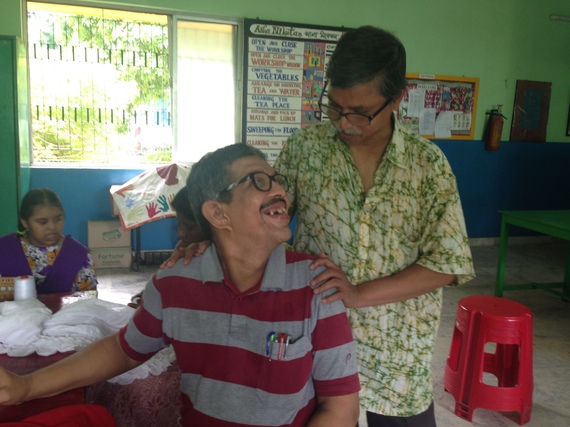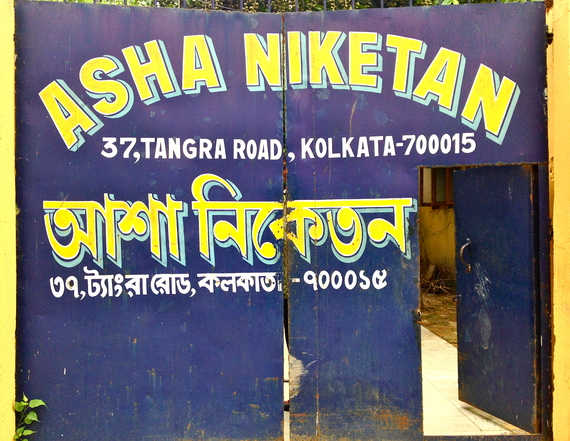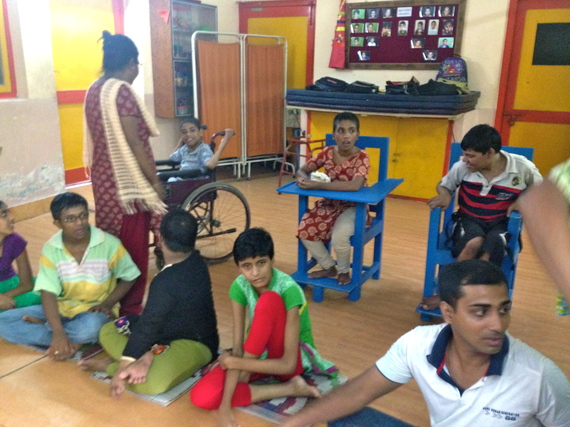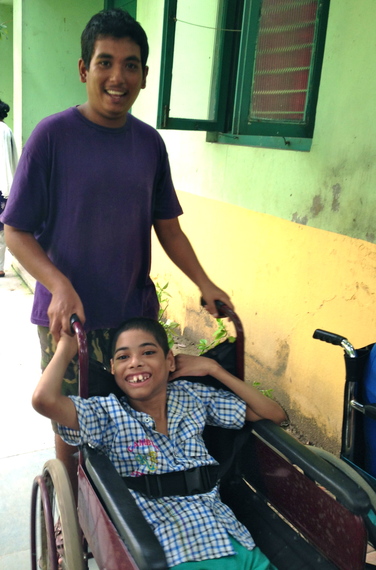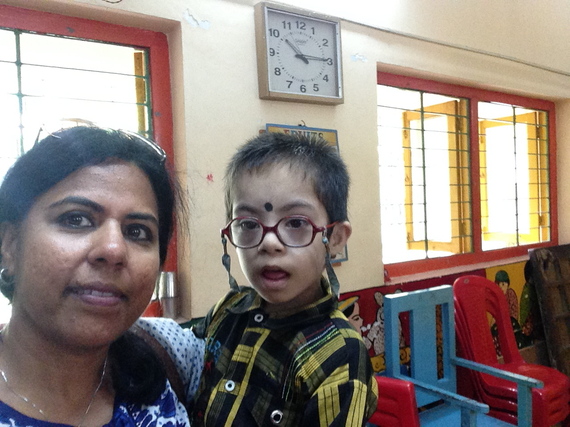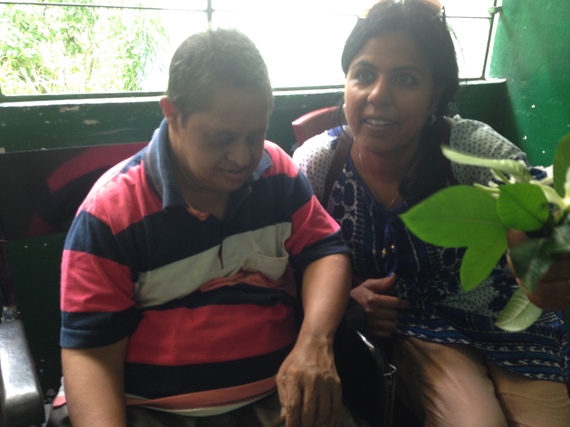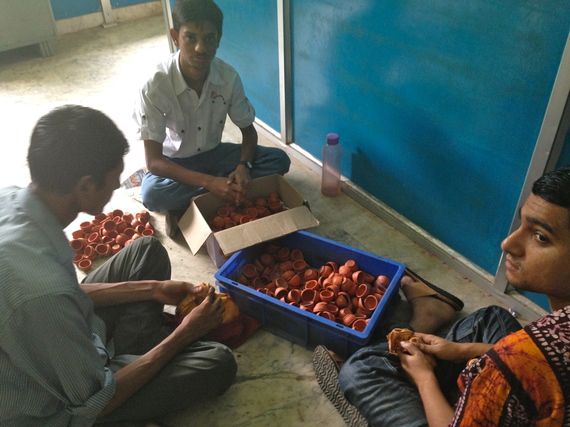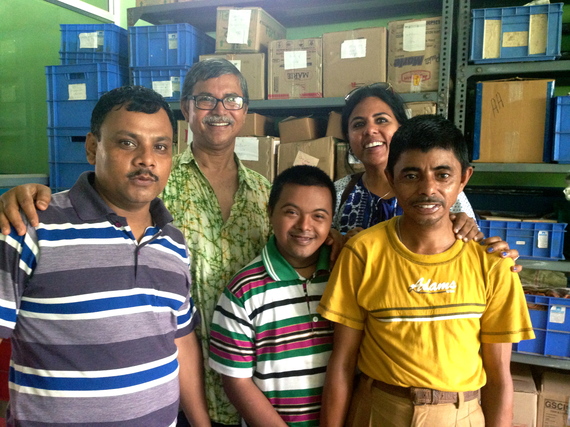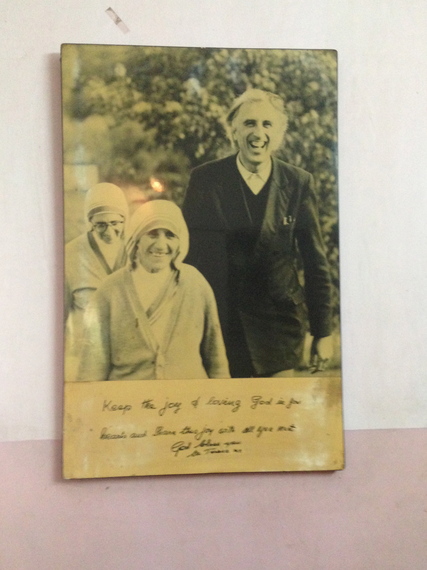
It just so happened that two days after my very first visit (and introduction) to a L'Arche community near Boston, I was slated to travel to Calcutta, India. Having had a remarkable experience, I was excited to visit the Kolkata community but somewhat apprehensive because this was India, and even with all its goodness and good intentions, things there often take on a life of their own.
I must admit that L'Arche, Kolkata, was another experience to behold and left me feeling shameful for ever doubting its sanctity. However, what saddened me was the enormity of need there; how fortunate were the few who had miraculously found a home at Asha Niketan, the Kolkata chapter of L'Arche but how sad that there were thousands more who needed the same tender, loving care yet would never receive it.
In order to understand how mental illness is commonly viewed in India, I must relate a story from my childhood that I have kept buried inside because it was so painful. Every morning en route to school when the City of Joy was just waking up, my school bus would snake its way through an impoverished area of Park Circus where the sidewalks teemed with street people getting ready to begin the day's struggles. And every day we would pass a young woman, naked from head to toe, walking the streets and yelling profanities because often, even at that early hour, she was mercilessly taunted, teased and touched by street urchins. Her unkempt, knotted hair was unevenly clipped and her body was the dirtiest I had set my eyes upon. Yet somewhere hidden under the layers of grime and filth was an innocent, pretty face and every morning I sadly wondered what her story was. I saw her wandering the streets for months, and then all of a sudden she disappeared. I was worried but convinced myself that she was finally receiving the help that she so badly needed. The following year on my first day as an 8th grader, I saw her again for one last time but was horror-struck. This time, still without an ounce of clothing covering her emaciated body, she was flaunting an enormous belly; she had to have been at least 8 months pregnant. I was sickened by what kind of a criminal mind could've done this to her (and a helpless, hapless child) and how something like this could happen in a civilized society. I would never know what became of her or her unborn child but that disturbing image makes me shudder even today. Unfortunately, this is not an isolated occurrence because even to this day people with mental illness and cognitive challenges are often abandoned by their families and are left to fend for themselves. They are referred to as "pagol" (mad) and are avoided and shunned by all. They can often be seen digging through trash left on the streets along with stray dogs, feral cats and sacred cows.
(I would be remiss if I did not mention something here. Although the families who abandon these children appear to be monsters, I want you to remember that as cruel as this appears to be, sometimes there is no other viable solution. They can barely make ends meet themselves and having a child who needs medicine and constant care is not an option when all family members, even the youngest ones, are busy earning a single meal day after day. Believe me when I say that the level of poverty in a third world country is unimaginable and makes me question the very existence of a kind and just Supreme Being).
Asha Niketan (House of Hope), built on a plot of land donated by Mother Theresa, and adjoining one of the homes run by the Missionaries of Charity, lived up to its name - it was a beacon of hope and optimism. The community was just as hospitable and warmhearted and just like in Haverhill some 8000 miles away, the members and assistants were genuinely happy at all times. In fact, Asha Niketan was a livelier place as a majority of its members are vibrant young kids - some of the sweetest, kindest, friendliest people one could ever meet. After a somewhat shy introduction, they were able to shed all their inhibitions and interact in a way that left me begging for more. In fact, my 22-year old niece Tuhina, who has an established job with a well-known tech firm in San Francisco and who accompanied me there twice, expressed genuine pangs of separation after leaving L'Arche. She said she had never experienced anything like this before and would easily quit her materialistic life to be with them; I assured her that I felt the same.
Although the spirit of Asha Niketan was the same as that of Gandhi House in Haverhill, what stands out is the tremendous need for support because of the poverty that most Westerners will not even begin to comprehend and most Easterners choose to turn a blind eye to. I momentarily took solace in Jean Vanier's thoughts on this:
When people love each other, they are content with very little. When we have light and joy in our hearts, we don't need material wealth. The most loving communities are often the poorest.
Nevertheless, when a community is so poor that it cannot regularly afford a total of 10,000 Rupees' ($150) worth of monthly medicine for its community members, it is a problem. This scarcity truly had no effect on the spirit of the members but irked those responsible for helping them, especially the littlest among them, most of who need medication to keep their Epileptic seizures under control. It bothered me beyond words that most pious Indians, who spend thousands of dollars each day bribing deities and supporting divinities, couldn't care less about the needy and the ailing. In fact, I learned that wealthy families who have children with cognitive challenges refuse to associate with Asha Niketan because of the members it houses. Most of them come from families that are well below poverty level, and the class system, although eradicated on paper, is still very much alive in India. Apparently to the privileged, superficial prestige is more important than sincere love.
In order to convey the essence of Asha Niketan, it is only fitting that I highlight the journey of a few of its members. The hardest part was choosing whom to feature because each story is extraordinary. Writing about these incredible lives was selfishly cathartic given that I never knew what happened to that ill-fated woman and her unborn child. Here is the story of a few such individuals who received a second chance at life by the grace of L'Arche and in the process changed the lives of those who came in contact with them, including mine: 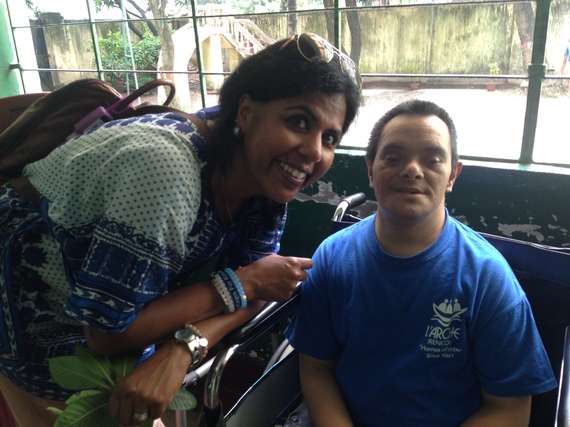
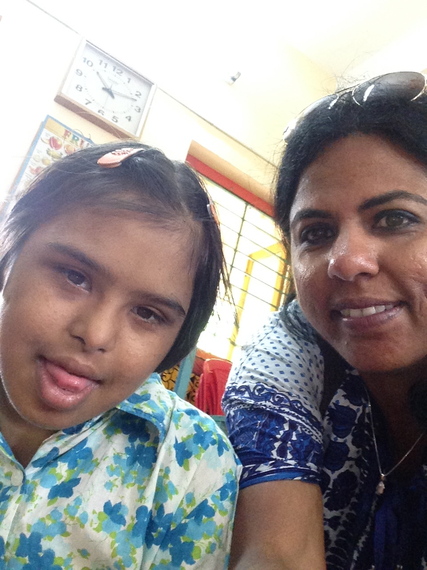
Madhu, whose name literally translates to 'honey' is a soft-spoken man in his late fifties. The Sisters of the Missionaries of Charity found him abandoned on the side of the streets many years ago in the most agonizing state with massive burns on his back. They brought him to Nirmal Hriday (Pure Heart)- the home for the dying- but miraculously, he survived. Sankar Paul, an Assistant with the community for 36 years, describes Madhu as a "deeply holy man with a heart of gold, who prays for everyone'. In 1986, Madhu was among the chosen few to receive Holy Communion by Pope John Paul II when he visited Calcutta. He loves to talk and is very proud of his command of the English language, which he speaks incessantly. Today he will happily tell you about his travels to L'Arche, Atlanta, which was a miracle in itself because an orphan, with no birth record, the Government of India would not grant him a passport. Madhu is an exemplary worker; in the morning he helps in the kitchen and in afternoon he works in the workshop making paper bags. In between he prays for the well-being of all; never is there a trace of grudge for the horrific pain that he had endured as a child because love has conquered all.
It is hard to believe that Papu, a quiet young man with a precious smile and a calm personality, was once the target of ruthless name-calling on the streets, and unable to cope with it, he would become uncontrollably aggressive. His parents, failing to understand him or deal with him, would physically abuse him. When Papu couldn't take it any more, he attempted suicide by consuming rat poison and became very ill. Soon Asha Niketan became a safe haven for him where his self-esteem soared and where his skills as a gifted artist began to emerge. Today Papu teaches others the fine art of candle making. In 2014 he won the "Best Craftsman" Award from the National Institute of the Mentally Challenged in Hyderabad. Papu's humble demeanor is proof of his gratitude toward L'Arche for the opportunity he was given when all his life he had been told that he would never amount to anything. Sankar still recalls his face the time he received his first salary; that same inexplicable joy is replicated each month when the working members receive their monthly salary - a meager sum of 500 Rupees (less than $10), most of which is often handed over to their needy families.
I was touched to see the deep friendship between two young men - Rajesh, a handsome boy with an unrestrained smile who has Downs Syndrome and Bapi, a young man with Paraplegia and a host of medical needs. At one point I saw Rajesh promptly get up from his chair during a lesson to help strap his friend comfortably into his seat.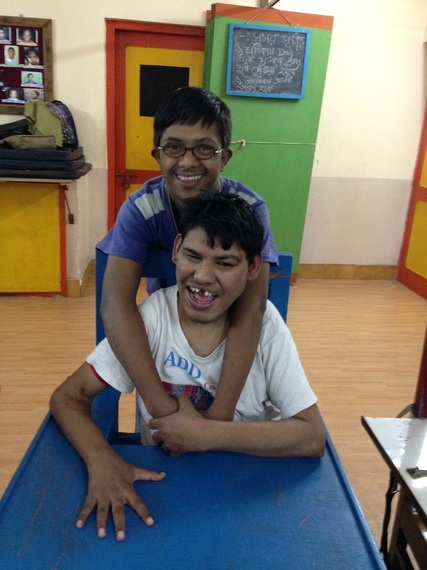 The transformation of their lives from a wild to a peaceful one is truly amazing. When I asked why Papu, at age 24, still attends the children's program since 1997, Rakhi, a beautiful, kind Assistant tried to hold back tears and said, "The medicines that he needs to keep his massive seizures under control are only for those who attend the Daycare and only until age 18. We have no other choice."
The transformation of their lives from a wild to a peaceful one is truly amazing. When I asked why Papu, at age 24, still attends the children's program since 1997, Rakhi, a beautiful, kind Assistant tried to hold back tears and said, "The medicines that he needs to keep his massive seizures under control are only for those who attend the Daycare and only until age 18. We have no other choice."
There are countless beautiful, capable children with much too common conditions who are not welcome in the regular schools in spite of the Persons with Disabilities Act of 1995 which promises equality and access - on paper only. In the last 42 years only two students from Asha Niketan have been accepted into the "normal schools" thanks to the relentless advocacy of dedicated folks like Rakhi. Rubina (Arabic - the Red gemstone), a beautiful kindergartener, and Abhijit (Sanskrit - victorious), a handsome 3rd grader, both from impoverished families and both out of control once, are flourishing today and will have a bright future someday. To think what would've happened to them without a L'Arche intervention is unimaginable! 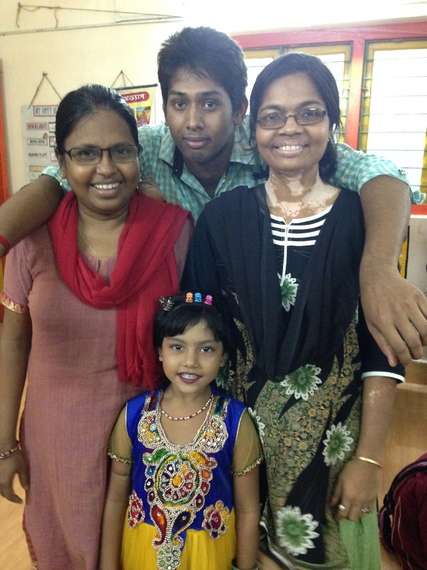
Another thing that stood out was something that made me supremely proud of my Indian heritage. The prayer and the meditation rooms which play an immensely important role in the L'Arche way of life, left me with a sense of awe about the open-mindedness of the common Indian and his respect for all religions and beliefs. The indoor prayer room displayed a book with each page dedicated to a verse borrowed from each of the major religions of the world and each day a different scripture is read during prayers. The outdoor meditation room, a modest brick structure in the middle of a lush vegetable garden, was something that restored my faith in humanity and peaceful coexistence, irrespective of faith. 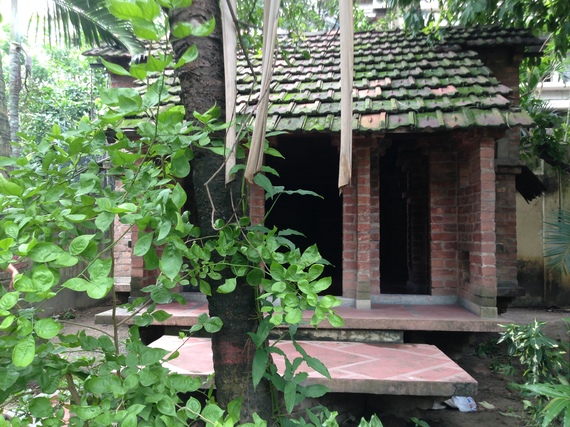
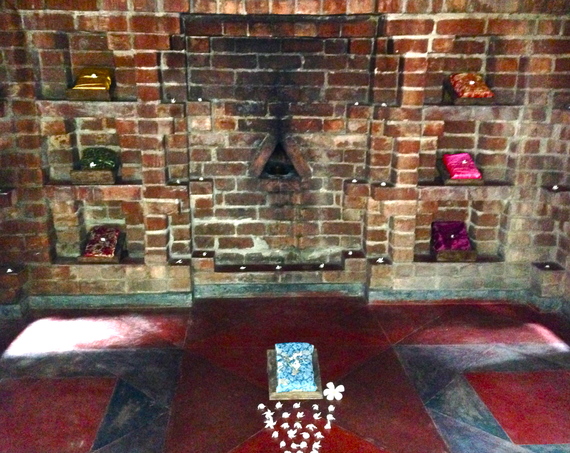
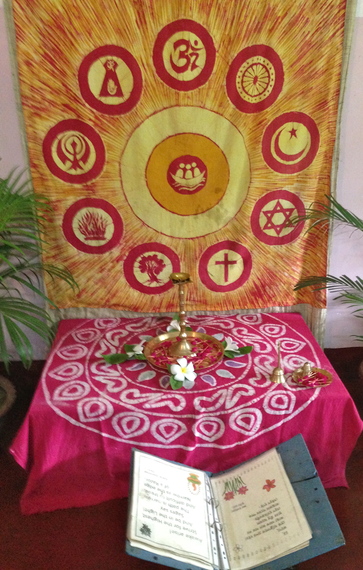
Madhu, Papu, Bapi and the other 77 members of Asha Niketan could have easily been the forgotten victims of an unacceptable disorder and an unwelcome disability. How wondrous that these immensely lucky souls, once roaming the streets close to where I experienced unfathomable disgust, somehow found this happy home where they were able to build a life for themselves while enriching the lives of others! To think that all this was possible because of an unshakable faith of one man in the endless power of love is truly humbling!
More and more L'Arche reminds me of an experience I had many years ago when traveling to Darjeeling in the foothills of the Himalayas; water was scarce and undrinkable on the hills of this mountain kingdom but occasionally we would come across the most pristine waterfall fed by the glaciers of the Himalayas. We would stop there, wet our feet and drink to our heart's content- the purest water imaginable and feel rejuvenated for the rest of the journey. A L'Arche community is that serene, invigorating, rare waterfall that quenches one's insatiable thirst in a world that is often filled with impurity. It is a haven for goodness, compassion and tenderness and somehow, no matter where it is tucked away, it manages to escape superficiality and sustain everything that is good in this world. Asha Niketan located on 37 Tangra Road, is one such oasis where I was able to shed all insignificant worldly cares and focus on what was essential to recharge the soul. L'Arche, Kolkata was another unforgettable lesson in love.
"Each human being, however small or weak, has something to bring to humanity. As we start to really get to know others, as we begin to listen to each other's stories, things begin to change. We begin the movement from exclusion to inclusion, from fear to trust, from closedness to openness, from judgment and prejudice to forgiveness and understanding. It is a movement of the heart."--- Jean Vanier
For more information and volunteer opportunities please visit http://itobuz.com/c/asha/about.html
or email ashaniketank@gmail.com
